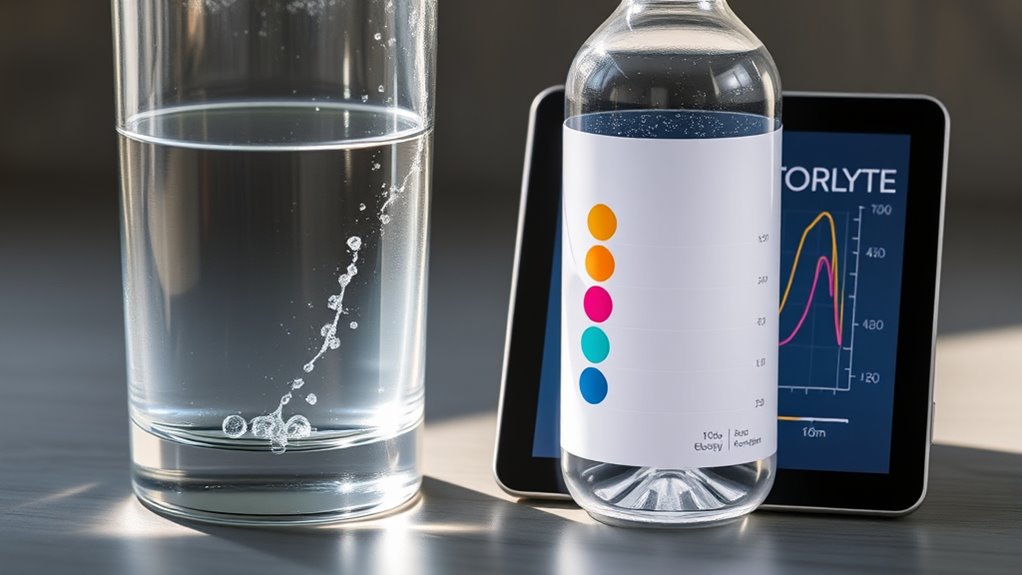To optimize hydration, you need the right balance of sodium and potassium. Sodium helps regulate water inside and outside your cells, supporting blood pressure and fluid retention, while potassium ensures your muscles and nerves function smoothly. Consuming foods rich in these minerals, like bananas, seaweed, and dairy, helps maintain this balance. Getting it correct can boost your performance and prevent cramps—keep exploring to discover how to perfect your electrolyte mix.
Key Takeaways
- Sodium and potassium regulate fluid balance, nerve signaling, and muscle function, essential for optimal hydration and physical performance.
- Proper electrolyte ratios prevent imbalances that cause cramps, fatigue, and dehydration during physical activity.
- Consuming a balanced mix of sodium and potassium through diet or supplements supports efficient fluid retention and cellular function.
- Hydration strategies integrate electrolyte intake before, during, and after exercise to maintain mineral balance and prevent performance decline.
- Emerging technologies enable personalized electrolyte solutions and real-time monitoring for optimal hydration and electrolyte management.
The Role of Electrolytes in Body Function

Electrolytes are essential minerals that help regulate numerous bodily functions, especially when it comes to maintaining fluid balance. One key role is sodium regulation, which influences how your body manages water inside and outside cells. Proper electrolyte absorption ensures that sodium and other minerals are efficiently taken in from food and beverages, supporting overall health. When electrolyte levels are balanced, your muscles function properly, nerve signals transmit correctly, and blood pressure stays stable. If absorption falters or sodium regulation is disrupted, you might experience dehydration, muscle cramps, or fatigue. Maintaining proper electrolyte levels is crucial for muscle function and overall physical performance. Additionally, the balance of electrolytes affects nerve impulse transmission, which is vital for coordination and reflexes. As technology advances, automation in healthcare plays a growing role in monitoring and managing electrolyte imbalances, helping to prevent complications. Proper hydration and a diet rich in essential minerals also support electrolyte absorption, ensuring your body maintains optimal fluid and mineral balance. Keeping electrolyte levels balanced through diet and hydration helps your body perform at its best. Understanding how electrolytes work empowers you to make choices that support your fluid balance and overall well-being.
How Sodium Regulates Fluid Balance

Sodium plays an essential role in controlling your body’s fluid balance by signaling where water should move within and between cells. Through sodium‘s regulatory mechanisms, it helps maintain proper hydration and ensures tissues stay balanced. When your sodium levels rise, your body responds by triggering fluid retention processes to preserve water in your bloodstream, supporting blood pressure and circulation. Additionally, the body’s ability to adjust fluid levels relies heavily on the sodium-potassium balance, which works together to regulate cellular function and fluid distribution throughout your body. Understanding how electrolyte balance impacts hydration can help you better manage your hydration needs and overall health.
Potassium’s Impact on Muscle Function and Nerve Signals

Potassium plays a key role in controlling muscle contractions and transmitting nerve signals. When your potassium levels are balanced, your muscles function smoothly, and your nerves send messages efficiently. Understanding how electrolytes like potassium support these processes helps you optimize your hydration and overall health. Proper tuning of electrolyte balance is essential for maintaining optimal muscle and nerve function. Additionally, maintaining proper electrolyte levels can help prevent issues like muscle cramps and nerve irregularities.
Muscle Contraction Regulation
Since potassium plays a crucial role in nerve signals and muscle contractions, understanding its impact helps explain how your muscles function properly. Proper potassium levels ensure your muscles contract smoothly, preventing muscle fatigue during activity. When you’re dehydrated or your hydration timing is off, potassium imbalance can occur, making it harder for your muscles to recover and increasing fatigue. This disruption hampers the electrical signals necessary for contraction, leading to weakness or cramping. Maintaining adequate hydration supports essential potassium function, helping your muscles contract efficiently and recover faster. Staying well-hydrated ensures your body keeps the right potassium balance, so your muscles perform at their best without fatigue or discomfort. Proper hydration timing is key to supporting muscle contraction regulation and overall performance. Self-awareness of your hydration needs can help optimize potassium levels and improve muscle function.
Nerve Signal Transmission
Your muscles rely on precise electrical signals to contract and relax properly, and these signals depend heavily on the balance of ions like potassium inside and outside nerve cells. Proper neural communication involves potassium helping generate nerve impulses that travel along reflex pathways, enabling quick responses. When potassium levels are ideal, your nervous system transmits signals efficiently, ensuring smooth muscle movements. But if potassium is out of balance, nerve signals weaken or become erratic, risking cramps or delayed responses.
- Feel the power of your reflexes staying sharp and responsive
- Experience muscle strength that moves with confidence
- Avoid the frustration of delayed reactions or weakness
- Trust your nervous system to protect and serve your body seamlessly
Electrolyte Balance Roles
Have you ever wondered how your muscles know when to contract or relax? It all comes down to electrolyte balance, especially potassium’s role. When your body efficiently absorbs electrolytes, it maintains proper mineral synergy, which is essential for muscle function and nerve signals. Potassium helps regulate the electrical signals that trigger muscle contractions and nerve impulses. If electrolyte absorption is disrupted, nerves may send faulty signals, leading to weakness or cramps. Maintaining the right potassium levels ensures your muscles respond quickly and smoothly. This delicate balance is fundamental for overall hydration and physical performance. By supporting electrolyte absorption and mineral synergy, you keep your nervous system and muscles working in harmony. This is the foundation of effective hydration and excellent muscle health.
The Science Behind Hydration and Performance

Your body relies on electrolyte balance to keep muscles and nerves functioning properly during exercise. Proper hydration directly influences your athletic output by maintaining this delicate equilibrium. When you stay hydrated, you optimize your performance and reduce the risk of fatigue or injury.
Electrolyte Balance and Function
Electrolytes are essential minerals that enable your body to maintain proper fluid balance, nerve function, and muscle performance. When your electrolyte levels are balanced, your muscles contract smoothly, nerves send clear signals, and hydration is maximized. Without this balance, you risk cramping, fatigue, or dehydration. To support optimal performance, you should adopt effective hydration strategies and consider electrolyte supplementation when needed.
Feel the difference:
- Conquer workout fatigue with balanced electrolytes
- Avoid cramps that stop you in your tracks
- Power through your day with sustained hydration
- Unlock your full potential with smarter hydration choices
Hydration and Athletic Output
Proper hydration directly impacts athletic performance by influencing how your muscles function and how efficiently your body produces energy. When you hydrate well, your muscles stay strong, reducing fatigue and cramping during exercise. Effective hydration strategies include drinking fluids before, during, and after activity, tailored to your sweat rate and intensity. Electrolyte supplementation plays a vital role in maintaining fluid balance and preventing imbalances that impair performance. Sodium and potassium help your muscles contract properly and support nerve function, ensuring you stay responsive and coordinated. Without proper hydration, your endurance drops, recovery slows, and you risk dehydration-related issues. By paying attention to hydration strategies and supplementing electrolytes when needed, you optimize your athletic output and maintain peak performance throughout your workout or competition.
Common Causes of Electrolyte Imbalances

Electrolyte imbalances often result from a variety of common causes that disrupt the body’s fluid and mineral balance. Dehydration causes are a primary factor, especially when you lose too much fluid through sweating, illness, or inadequate intake. Medication effects, like diuretics or certain antibiotics, can also interfere with electrolyte levels, making imbalances more likely. Additionally, extreme physical activity without proper hydration worsens this issue. Sometimes, underlying health conditions like kidney disease or hormonal imbalances play a role. Recognizing these causes helps you take proactive steps to maintain balance and avoid complications.
- Overexertion during exercise
- Excessive sweating without replacement
- Use of medications that alter mineral levels
- Illnesses causing vomiting or diarrhea
Signs and Symptoms of Sodium and Potassium Deficiencies

When sodium and potassium levels drop below normal, you’ll notice a range of symptoms that indicate these essential minerals are imbalanced. Dehydration symptoms, such as dizziness, fatigue, and muscle weakness, often appear as your body struggles to maintain fluid and electrolyte balance. An electrolyte deficiency can lead to cramping, irregular heartbeat, and confusion. You might also experience nausea or a sudden drop in blood pressure. These signs signal that your body’s natural electrolyte harmony is disrupted, affecting nerve function and muscle contractions. If left unaddressed, these symptoms can worsen, increasing the risk of serious complications. Recognizing these early warning signs helps you take action before dehydration or electrolyte imbalance becomes more severe. Staying alert to these symptoms ensures better management of your hydration and mineral levels.
Optimal Sources of Sodium and Potassium in Diet

Incorporating a variety of foods rich in sodium and potassium into your diet helps maintain healthy electrolyte levels. Natural food sources like fruits, vegetables, nuts, and dairy are excellent choices to boost these minerals. For potassium, bananas, sweet potatoes, spinach, and oranges are powerful options. Sodium can be found in seaweed, dairy, and naturally salted meats. If needed, dietary supplements can help fill gaps, but focus on whole foods first for ideal absorption. Ensuring your diet includes these nutrient-dense options keeps your body energized and balanced. Remember, moderation is key—overdoing it with salt or potassium supplements can be harmful. Prioritize natural sources to nourish your body and support your hydration needs every day. Your health depends on making smart, balanced choices.
Balancing Electrolytes for Athletic Performance

Maintaining proper electrolyte balance is essential for maximizing athletic performance, as it directly influences muscle function, hydration, and overall endurance. To achieve this, you can use electrolyte cocktails tailored to your activity level and sweat rate. These drinks help replenish sodium, potassium, and other minerals lost through sweating, preventing cramps and fatigue. Hydration tracking is key—monitor your fluid intake and electrolyte levels to avoid over- or under-hydration. Incorporate electrolyte-rich foods and drinks before, during, and after exercise to sustain ideal balance. Stay attentive to your body’s signals, adjusting your hydration strategy accordingly. Proper electrolyte management keeps your muscles functioning smoothly and ensures you perform at your best throughout your workout or competition.
Innovative Approaches to Hydration and Electrolyte Management

Have you explored the latest innovations transforming hydration and electrolyte management? New strategies are revolutionizing how you stay energized and balanced. Innovative hydration strategies now include personalized electrolyte supplementation techniques, tailored to your activity level and sweat rate. These advancements help you optimize fluid intake and prevent dehydration more effectively. Imagine using smart bottles that monitor your hydration status, or electrolyte powders designed for rapid absorption. These tools make maintaining the perfect balance easier than ever. You’re empowered to prevent cramping, boost performance, and recover faster. The future brings smarter, more targeted solutions to hydration, ensuring you stay at your best no matter the challenge.
Discover smart hydration solutions tailored to your activity and sweat rate for optimal performance and faster recovery.
- Feel confident knowing you’re using cutting-edge techniques
- Experience sustained energy with personalized formulas
- Regain control over your hydration routine
- Access your full potential with smarter solutions
Frequently Asked Questions
How Do Electrolytes Influence Mental Clarity and Cognitive Function?
Electrolytes like sodium and potassium play a key role in neural transmission, which directly impacts your mental clarity and cognitive performance. When your electrolyte levels are balanced, nerve signals transmit efficiently, helping you stay alert and focused. Conversely, imbalances can cause brain fog or fatigue. By maintaining proper electrolyte levels through hydration, you support peak neural function, ensuring your mind stays sharp and your cognitive abilities remain at their best.
Can Electrolyte Imbalances Affect Long-Term Heart Health?
You might not notice it now, but electrolyte imbalances can quietly influence your heart health over time. When these imbalances occur, they can lead to irregular heart rhythms and other issues that, if left unchecked, may impact your long-term well-being. Staying mindful of your electrolyte levels helps keep your heart strong and resilient. Prioritizing proper hydration and nutrition guarantees your heart remains in harmony, safeguarding your future health.
Are There Natural Ways to Optimize Electrolyte Levels Without Supplements?
You can naturally optimize electrolyte levels through dietary adjustments and incorporating natural sources. Eating foods rich in potassium, like bananas, sweet potatoes, and spinach, helps maintain balance. Including sources of sodium, such as sea salt or pickles, can also assist. Staying consistent with a balanced diet guarantees your electrolytes stay in check without needing supplements. Remember, proper hydration combined with these natural sources supports overall electrolyte health effectively.
How Do Hydration Needs Differ Across Different Age Groups?
Oh, sure, because your hydration needs are exactly the same whether you’re a sprightly toddler or a wise octogenarian, right? Actually, age-specific hydration varies considerably; kids need more fluids for development, while older adults require careful balance to prevent dehydration. In short, your developmental hydration needs change over time, so it’s essential to adjust your intake accordingly—no one-size-fits-all here, just personalized hydration wisdom.
What Are Emerging Technologies for Personalized Hydration Strategies?
Emerging technologies for personalized hydration strategies include wearable sensors and AI algorithms that monitor your hydration levels in real-time. These devices track factors like sweat composition and hydration status, providing tailored recommendations to optimize fluid intake. By analyzing data continuously, AI-powered systems help you maintain proper hydration efficiently, reducing risks and enhancing performance. You can benefit from these innovations by staying better informed and adjusting your hydration plan proactively.
Conclusion
Understanding how sodium and potassium work together helps you stay hydrated and perform your best. For example, imagine an athlete who struggles with cramps during workouts; by balancing their electrolyte intake, they can restore muscle function and prevent injuries. Prioritizing foods rich in these minerals and staying mindful of imbalances guarantees your body functions efficiently. With the right mix, you can boost endurance, recover faster, and keep your hydration game strong.









